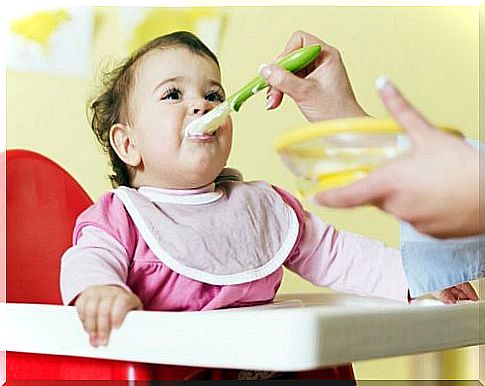7 Suggestions For Vegetable Puree For Babies

You can start giving vegetable puree to babies when they are around 6 months. Puree is a perfect way to give your little ones a balanced diet.
Milk can only cover all the nutritional needs of the children until they are 6 months old. Then you can start providing a slightly more varied diet and introduce new foods. Vegetable puree for babies may be one of the first things you can offer your baby when they enter this new phase.
Puree is definitely a good way to get vegetables introduced into your child’s diet. Here are some recipes you can try. Remember that you can adapt these recipes to your child’s taste buds.
7 vegetable purees for babies
Here are seven excellent and practical recipes for vegetable puree:
Mashed green beans
Ingredients
- 200 grams of fresh mashed green beans
- Water or milk for babies
- Olive oil
Preparation
- First, wash and cut the green beans into small pieces.
- Steam them for 10-15 minutes.
- Cool the beans in cold water to preserve their color.
- Finish by draining the beans and mixing them in a little olive oil and milk for babies until you get the right consistency.
Spinach puree
Ingredients
- 150 grams of spinach leaves
- Water
- Olive oil
Preparation
- Wash spinach leaves well and place them in a saucepan of boiling water. Cook them for 5 minutes.
- Finally, steam off and mix with a little water.

Carrot and squash puree
Ingredients
- 2 small carrots
- 2 squash
- 2 tablespoons cheese
- 1 leaf basil
- Olive oil
Preparation
- Wash and peel the vegetables
- Cut them into small cubes and cook them for 20 minutes
- Finally, mix all the ingredients until they become a thick and lump-free consistency
Carrot and mashed potatoes with Roquefort cheese
Ingredients
- 1 potato
- 2 small carrots
- 10 cl milk for babies
- 1 piece of Roquefort cheese (25 to 30 grams)
Preparation
- Wash, peel and cut vegetables into small pieces.
- Next, put potatoes, carrots in a saucepan of water and cook for 15 to 20 minutes.
- Heat the milk in a separate pan, add Roquefort cheese to the pan until it melts.
- Finally, mix all the ingredients together until the product has a homogeneous consistency.
Pumpkin puree
Ingredients
- 1 piece of pumpkin
- 1 ost
- Water
- Olive oil
Preparation
- Peel a squash, grate it and remove the seeds.
- Cut the pumpkin into small pieces.
- Cook the pumpkin pieces for 15 minutes.
- Finally, mash the cooked pumpkin. Then add the cheese and a little olive oil as well as a little water.
Puree asparagus
Ingredients
- 5 green asparagus
- 1 potato
- 1 tsp. thick cream
Preparation
- First peel the asparagus and wash it in water. Then cut it into small pieces.
- Wash and peel the potatoes, then cut them into small cubes.
- Boil asparagus and potatoes for 10 to 15 minutes.
- Check to see that they are cooked through. Asparagus and potatoes should be soft.
- Mix well until they reach the desired consistency. There is a lot of water in asparagus, so it is good to sift them first before they are to be made into puree.
- Add a spoonful of cream.
Potato and artichoke puree
Ingredients
- 2 artichokes
- 1/3 of a sweet potato
- Water
- 1 teaspoon olive oil
- 1 teaspoon pasteurized thick cream

Preparation
- First, wash and peel the potatoes, then cut them into small cubes.
- Then wash the artichokes. Cook the artichokes and potatoes until both are soft.
- Mix well until you get the desired consistency. You can add water and vegetable broth.
- When ready to be served, add a teaspoon of olive oil and cream to make the puree creamy.
As you can see, vegetable puree for babies is a great way to vary the food. Try to avoid vegetables with very strong taste and where digestion can cause pain such as celery, peas and beets.
Keep in mind that the best vegetables during this period should be the ones that can be easily digested. Good examples are carrots, green beans, spinach and squash.









